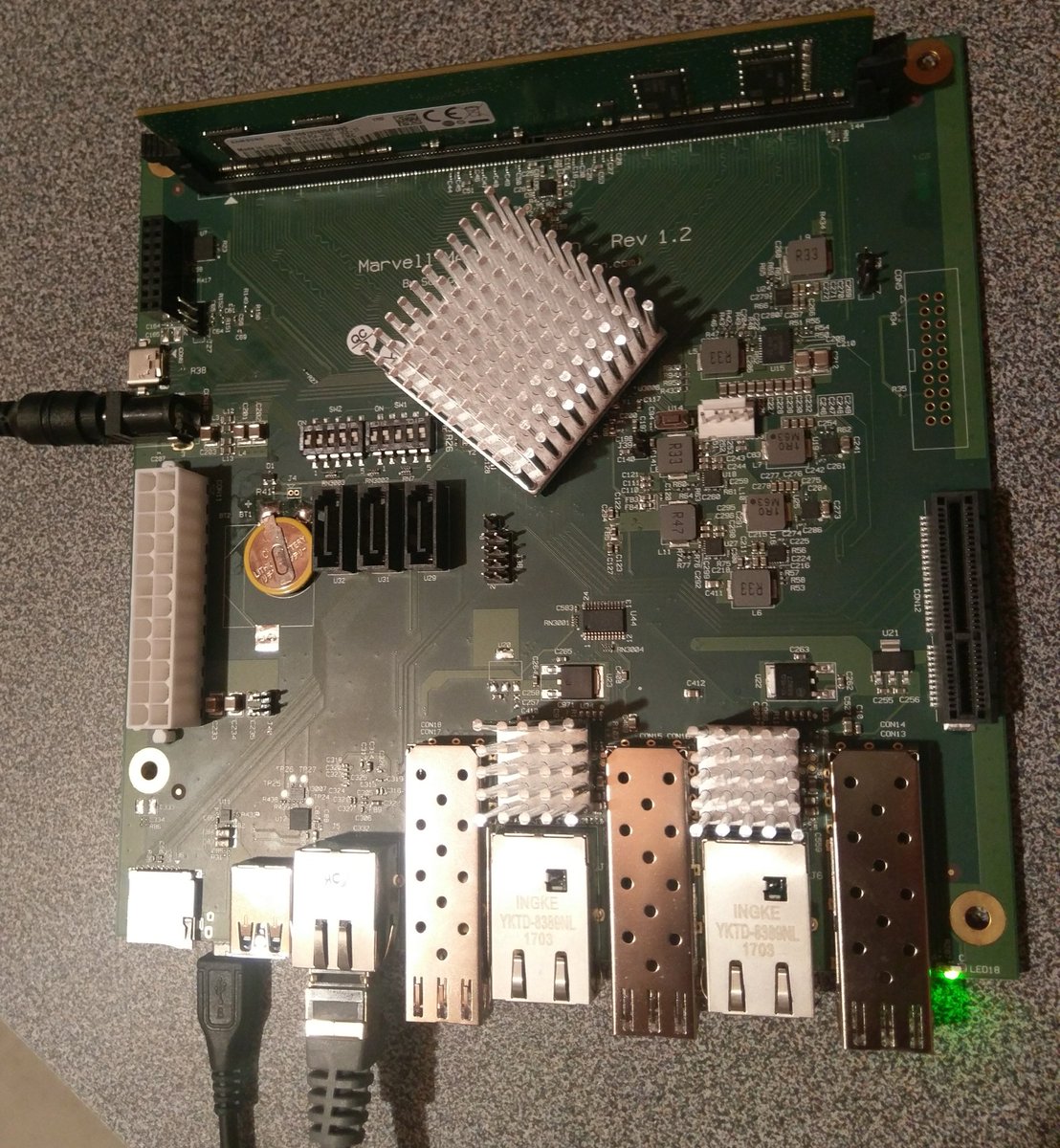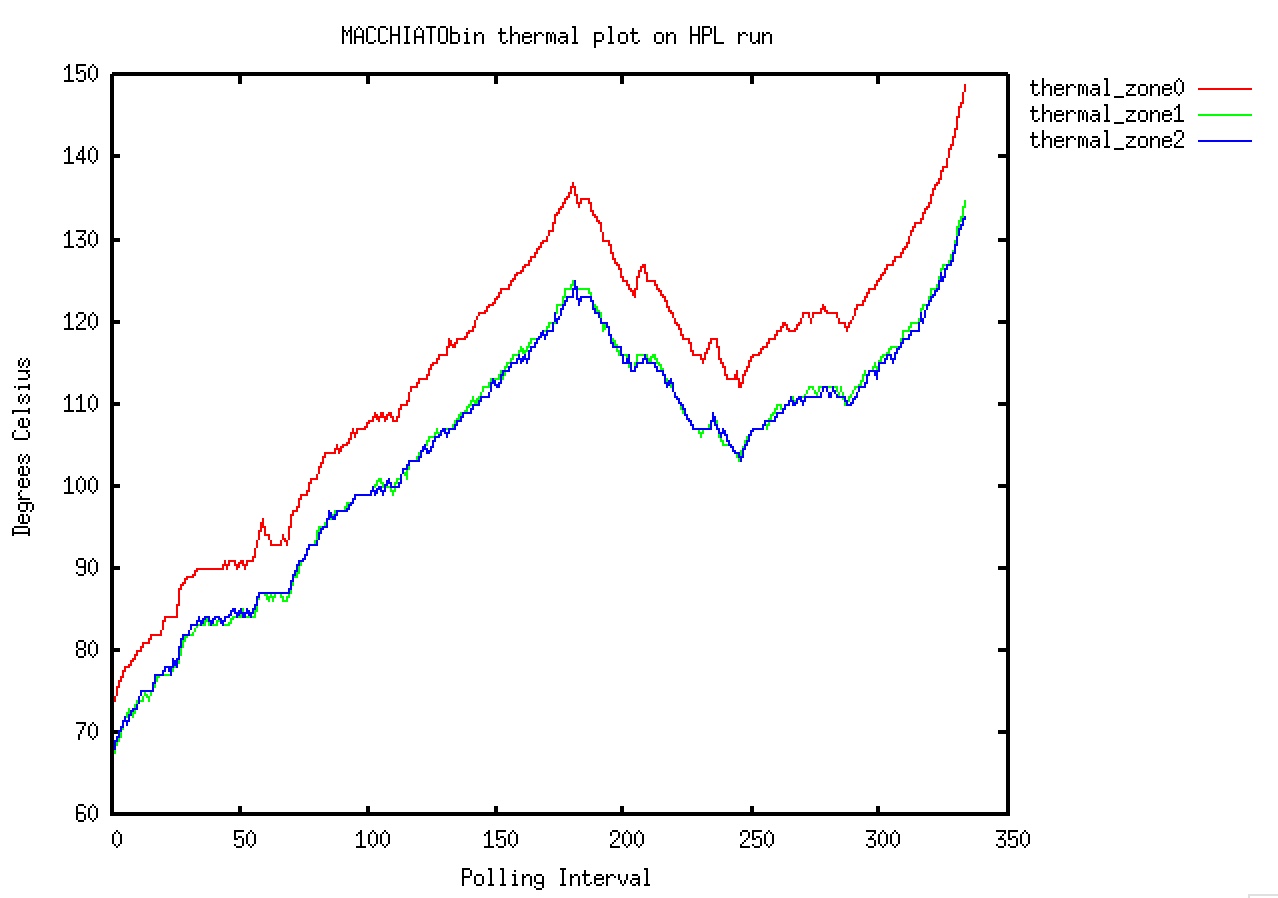Turning up the heat...on my Armada 8040
Although I took delivery of a shiny new SolidRun Marvell macchiatoBIN a few months back (end May), I’ve not really had a chance to put it through it’s paces until now. For those of you who are not familiar with the board, it’s a high-performance 64-bit Arm (v8) board designed really for networking. It’s based on the Marvell ARMADA 8040 processor for those who like to keep track. For those looking for more information about the board, there is a community page here.
What struck me about the board when I originally unpacked it were the shiny heatsinks. Definitely looks cool on my workbench (desk)! They did seem up to the task of keeping the mighty ARMADA 8040 cool as a cucumber - or so I thought.

Following the procedure (struggling) to install Ubuntu as described on the macchiatoBIN wiki - which ironically required me to use an x86 box to compile some necessary bits, I was off to the races with Ubuntu 16.04.3 LTS (Xenial Xerus). Note that this whole procedure left much to be desired as it was my understanding that this board was to be ARM SBSA compliant - which would allow any compliant OS distro to be used. This is something which at the time of writing is not the case - hope that an update does address this.
Being a high-performance computing kind of guy, my first challenge was to run the High-Performance Linpack (HPL) on the system. HPL you say? Yes, I know we can debate the merits of HPL all day long, but nevertheless it’s still a measure of some specific dimensions of system performance - and indeed it’s used to rank systems on the TOP500 list of Supercomputers. Because I was looking to run more than just HPL on the system, I opted to install Phoronix test suite which includes HPCC (HPC Challenge) as an available benchmark.
To get warmed up, I decided to first run the well know stream memory benchmark. Via Phoronix, I installed the stream benchmark and executed it.
root@flotta:~# phoronix-test-suite install-test pts/stream
Phoronix Test Suite v5.2.1
To Install: pts/stream-1.3.1
Determining File Requirements ...........................................
Searching Download Caches ...............................................
1 Test To Install
1 File To Download [0.01MB]
1MB Of Disk Space Is Needed
pts/stream-1.3.1:
Test Installation 1 of 1
1 File Needed [0.01 MB / 1 Minute]
Downloading: stream-2013-01-17.tar.bz2 [0.01MB]
Estimated Download Time: 1m .........................................
Installation Size: 0.1 MB
Installing Test @ 19:45:06
[NOTICE] Undefined: 0 in phodevi_cpu:267
[NOTICE] Undefined: 0 in phodevi_cpu:272Next, we execute the benchmark stream
root@flotta:~# phoronix-test-suite benchmark pts/stream
Phoronix Test Suite v5.2.1
Installed: pts/stream-1.3.1
Stream 2013-01-17:
pts/stream-1.3.1
Memory Test Configuration
1: Copy
2: Scale
3: Add
4: Triad
5: Test All Options
Type: 5
System Information
Hardware:
Processor: Unknown @ 1.30GHz (4 Cores), Memory: 4096MB, Disk: 8GB 8GME4R
Software:
OS: Ubuntu 16.04, Kernel: 4.4.8-armada-17.02.2-g4126e30 (aarch64), Compiler: GCC 5.4.0 20160609, File-System: ext4
Would you like to save these test results (Y/n): n
Stream 2013-01-17:
pts/stream-1.3.1 [Type: Copy]
Test 1 of 4
Estimated Trial Run Count: 5
Estimated Test Run-Time: 7 Minutes
Estimated Time To Completion: 25 Minutes
Started Run 1 @ 19:46:03
Started Run 2 @ 19:48:09
Started Run 3 @ 19:50:14
Started Run 4 @ 19:52:19
Started Run 5 @ 19:54:24 [Std. Dev: 0.35%]
Test Results:
6701.1
6669.1
6655.9
6637.4
6657.1
Average: 6664.12 MB/s
Stream 2013-01-17:
pts/stream-1.3.1 [Type: Scale]
Test 2 of 4
Estimated Trial Run Count: 5
Estimated Test Run-Time: 7 Minutes
Estimated Time To Completion: 19 Minutes
Started Run 1 @ 19:56:27
Started Run 2 @ 19:56:27
Started Run 3 @ 19:56:27
Started Run 4 @ 19:56:27
Started Run 5 @ 19:56:27 [Std. Dev: 0.12%]
Test Results:
7248.8
7261.8
7252.8
7245.6
7266.1
Average: 7255.02 MB/s
Stream 2013-01-17:
pts/stream-1.3.1 [Type: Triad]
Test 3 of 4
Estimated Trial Run Count: 5
Estimated Test Run-Time: 7 Minutes
Estimated Time To Completion: 13 Minutes
Started Run 1 @ 19:56:27
Started Run 2 @ 19:56:27
Started Run 3 @ 19:56:27
Started Run 4 @ 19:56:27
Started Run 5 @ 19:56:27 [Std. Dev: 0.47%]
Test Results:
6872.3
6895.9
6934.9
6847.9
6889.5
Average: 6888.10 MB/s
Stream 2013-01-17:
pts/stream-1.3.1 [Type: Add]
Test 4 of 4
Estimated Trial Run Count: 5
Estimated Time To Completion: 7 Minutes
Started Run 1 @ 19:56:27
Started Run 2 @ 19:56:27
The test run ended prematurely.
Started Run 3 @ 19:56:27
Started Run 4 @ 19:56:27
Started Run 5 @ 19:56:27
The test run ended prematurely. [Std. Dev: 0.09%]
Test Results:
6559.5
6549.8
6560.8
Average: 6556.70 MB/sWe see during execution that stream definitely puts the system through it’s paces
top - 19:47:20 up 3:07, 2 users, load average: 3.10, 1.21, 0.70
Tasks: 119 total, 2 running, 117 sleeping, 0 stopped, 0 zombie
%Cpu(s): 96.3 us, 0.4 sy, 0.0 ni, 1.7 id, 0.0 wa, 0.0 hi, 1.7 si, 0.0 st
KiB Mem : 3779668 total, 986744 free, 2410052 used, 382872 buff/cache
KiB Swap: 0 total, 0 free, 0 used. 1287376 avail Mem
PID USER PR NI VIRT RES SHR S %CPU %MEM TIME+ COMMAND
18920 root 20 0 2370508 2.236g 1336 R 389.1 62.0 4:54.12 stream-bin
6854 root 20 0 0 0 0 S 2.3 0.0 0:07.30 kworker/u8+
18924 root 20 0 9288 3208 2632 R 0.7 0.1 0:00.37 top
3 root 20 0 0 0 0 S 0.3 0.0 0:00.50 ksoftirqd/0
1 root 20 0 6868 5144 3476 S 0.0 0.1 0:03.90 systemd
2 root 20 0 0 0 0 S 0.0 0.0 0:00.00 kthreadd
5 root 0 -20 0 0 0 S 0.0 0.0 0:00.00 kworker/0:+
7 root 20 0 0 0 0 S 0.0 0.0 0:01.82 rcu_preempt
8 root 20 0 0 0 0 S 0.0 0.0 0:00.00 rcu_sched
9 root 20 0 0 0 0 S 0.0 0.0 0:00.00 rcu_bh
10 root rt 0 0 0 0 S 0.0 0.0 0:00.08 migration/0
11 root rt 0 0 0 0 S 0.0 0.0 0:00.14 watchdog/0
12 root rt 0 0 0 0 S 0.0 0.0 0:00.11 watchdog/1
13 root rt 0 0 0 0 S 0.0 0.0 0:00.07 migration/1
14 root 20 0 0 0 0 S 0.0 0.0 0:00.03 ksoftirqd/1
16 root 0 -20 0 0 0 S 0.0 0.0 0:00.00 kworker/1:+
17 root rt 0 0 0 0 S 0.0 0.0 0:00.13 watchdog/2Onward and upward as they say. Moving to the HPCC benchmark which contains HPL. We install the pts/hpcc test for Phoronix.
root@flotta:~# phoronix-test-suite install-test pts/hpcc
Phoronix Test Suite v5.2.1
To Install: pts/hpcc-1.2.0
Determining File Requirements ...........................................
Searching Download Caches ...............................................
1 Test To Install
1 File To Download [0.63MB]
9MB Of Disk Space Is Needed
pts/hpcc-1.2.0:
Test Installation 1 of 1
1 File Needed [0.63 MB / 1 Minute]
Downloading: hpcc-1.5.0.tar.gz [0.63MB]
Estimated Download Time: 1m .........................................
Installation Size: 9 MB
Installing Test @ 20:00:53
[NOTICE] Supported install-time optional variables include $MPI_PATH,
$MPI_INCLUDE, $MPI_CC, $MPI_LIBS, $LA_PATH, $LA_INCLUDE, $LA_LIBS,
$CFLAGS, $LD_FLAGS, and $MPI_LD
[NOTICE] Supported run-time optional environment variables include
$N, $NB, $MPI_NUM_THREADS, $HOSTFILEBefore starting the HPL run, I put together a quick script to monitor the temperature utilization during the HPL run. The script simply prints out the values of /sys/class/thermal/thermal_zone[X]/temp in human readable format.
#!/bin/sh
while [ true ]
do
echo "$(date) @ $(hostname)"
echo "-----------------------"
cpu0=`cat /sys/class/thermal/thermal_zone0/temp`
cpu1=`cat /sys/class/thermal/thermal_zone1/temp`
cpu2=`cat /sys/class/thermal/thermal_zone2/temp`
echo "thermal_zone0 = $((cpu0/1000)) 'C"
echo "thermal_zone1 = $((cpu1/1000)) 'C"
echo "thermal_zone2 = $((cpu2/1000)) 'C"
/bin/sleep 10
doneAfter starting HPL and monitoring the temperatures, I found that they rapidly climbed to some rather uncomfortable levels - especially given that my ARMADA 8040 board currently has no cooling fan. So after kicking off the initial run (see below) I decided to err on the side of caution and get a fan setup before I do any serious damage to the board.
gsamu@flotta:~$ phoronix-test-suite benchmark pts/hpcc
Phoronix Test Suite v5.2.1
Installed: pts/hpcc-1.2.0
HPC Challenge 1.5.0:
pts/hpcc-1.2.0
Processor Test Configuration
1: G-HPL
2: G-Ptrans
3: G-Random Access
4: G-Ffte
5: EP-STREAM Triad
6: EP-DGEMM
7: Random Ring Latency
8: Random Ring Bandwidth
9: Max Ping Pong Bandwidth
10: Test All Options
Test / Class: 1
System Information
[NOTICE] Undefined: 0 in phodevi_cpu:267
[NOTICE] Undefined: 0 in phodevi_cpu:272
Hardware:
Processor: Unknown @ 1.30GHz (4 Cores), Memory: 4096MB, Disk: 8GB 8GME4R
Software:
OS: Ubuntu 16.04, Kernel: 4.4.8-armada-17.02.2-g4126e30 (aarch64), Compiler: GCC 5.4.0 20160609, File-System: ext4
Would you like to save these test results (Y/n): n
HPC Challenge 1.5.0:
pts/hpcc-1.2.0 [Test / Class: G-HPL]
Test 1 of 1
Estimated Trial Run Count: 3
Estimated Time To Completion: 1 Hour, 28 Minutes
Started Run 1 @ 20:12:13^CThe above run was aborted when the temperature shown by my temperature monitoring script peaked 100 C.
Tue Aug 29 20:23:12 EDT 2017 @ flotta.localdomain
-----------------------
thermal_zone0 = 99 'C
thermal_zone1 = 91 'C
thermal_zone2 = 92 'C
Tue Aug 29 20:23:22 EDT 2017 @ flotta.localdomain
-----------------------
thermal_zone0 = 100 'C
thermal_zone1 = 92 'C
thermal_zone2 = 92 'C
Tue Aug 29 20:23:32 EDT 2017 @ flotta.localdomain
-----------------------
thermal_zone0 = 101 'C
thermal_zone1 = 93 'C
thermal_zone2 = 93 'C
Tue Aug 29 20:23:42 EDT 2017 @ flotta.localdomain
-----------------------
thermal_zone0 = 101 'C
thermal_zone1 = 94 'C
thermal_zone2 = 93 'C
Tue Aug 29 20:23:52 EDT 2017 @ flotta.localdomain
-----------------------
thermal_zone0 = 101 'C
thermal_zone1 = 94 'C
thermal_zone2 = 94 'CSo as I wait for my new cooling fan and Open Benchtable to arrive, I’ll get back to thrashing some good old Intel hardware…Hey for some real fun, I can disconnect the CPU fans on those ones :)
Gábor out!
UPDATE!!!
Well I decided to press ahead tonight with a run of HPL on my macchiatoBIN board. To monitor the temperature (recall that my current configuration is with passive cooling) I put together a small script to dump the values of the following to a text file during the HPL run:
- /sys/class/thermal/thermal_zone0/temp
- /sys/class/thermal/thermal_zone1/temp
- /sys/class/thermal/thermal_zone2/temp
The run started ok, but I lost contact with the macchiatoBIN after about 55 minutes…when it was on run 2 of HPL:
gsamu@flotta:~$ phoronix-test-suite benchmark pts/hpcc
Phoronix Test Suite v5.2.1
Installed: pts/hpcc-1.2.0
HPC Challenge 1.5.0:
pts/hpcc-1.2.0
Processor Test Configuration
1: G-HPL
2: G-Ptrans
3: G-Random Access
4: G-Ffte
5: EP-STREAM Triad
6: EP-DGEMM
7: Random Ring Latency
8: Random Ring Bandwidth
9: Max Ping Pong Bandwidth
10: Test All Options
Test / Class: 1
System Information
[NOTICE] Undefined: 0 in phodevi_cpu:267
[NOTICE] Undefined: 0 in phodevi_cpu:272
Hardware:
Processor: Unknown @ 1.30GHz (4 Cores), Memory: 4096MB, Disk: 8GB 8GME4R
Software:
OS: Ubuntu 16.04, Kernel: 4.4.8-armada-17.02.2-g4126e30 (aarch64), Compiler: GCC 5.4.0 20160609, File-System: ext4
Would you like to save these test results (Y/n): n
HPC Challenge 1.5.0:
pts/hpcc-1.2.0 [Test / Class: G-HPL]
Test 1 of 1
Estimated Trial Run Count: 3
Estimated Time To Completion: 1 Hour, 28 Minutes
Started Run 1 @ 19:20:10
Started Run 2 @ 19:50:34And I guess this gives the reason (from /var/log/messages)…
Feb 6 20:18:35 flotta kernel: armada_thermal f06f808c.thermal: Overheat critical high threshold temperature reachedPlotting the temperature metrics with gnuplot - we see that we were well in the triple digits. Oh my! At this stage, I should probably stop abusing this poor board and wait until my Noctua industrial fan arrives :)

